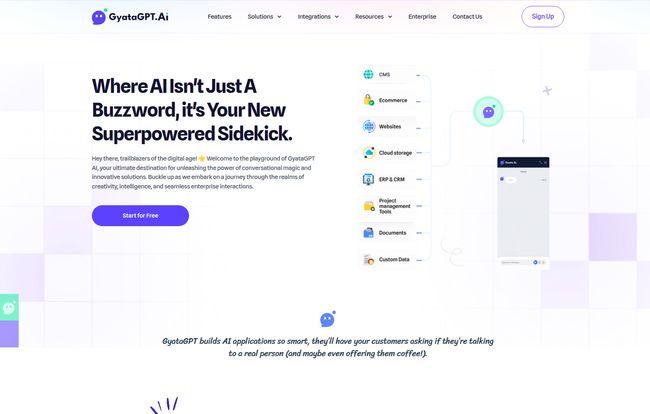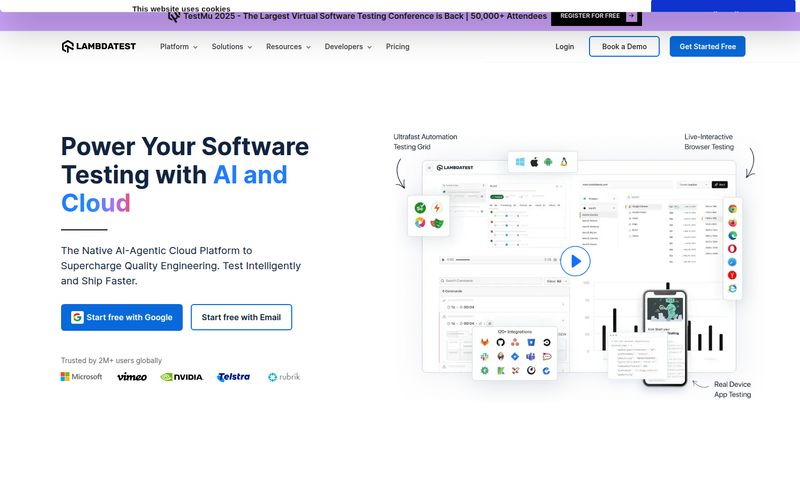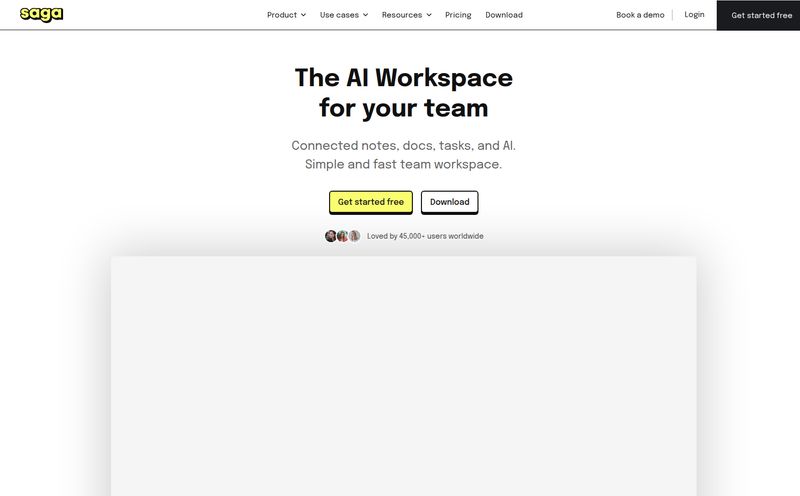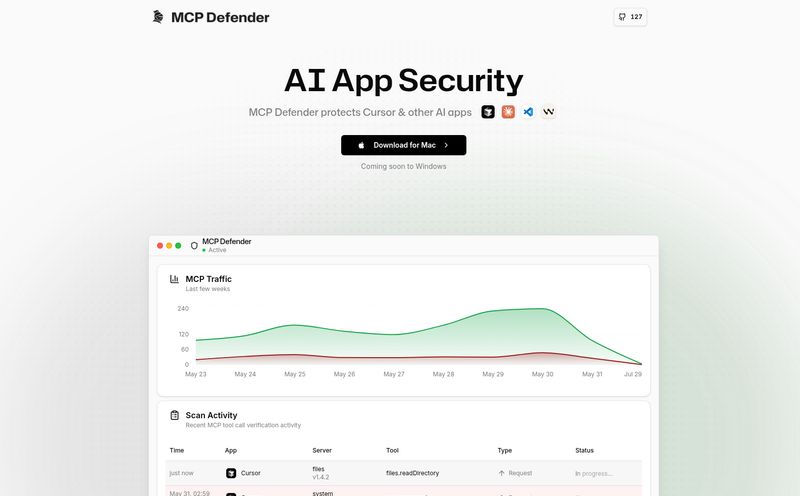For the last couple of years, every client meeting, every conference call, every industry webinar has had the same three letters haunting the conversation: A-I. Specifically, generative AI. Everyone wants a piece of the pie. The problem? No one wants to give away the recipe to their secret sauce in the process.
We've all seen the power of tools like ChatGPT. It’s incredible. But for any serious business, the idea of feeding your proprietary sales data, customer lists, or internal R&D notes into a public model is... well, it's terrifying. It’s like shouting your company secrets into a crowded stadium and just hoping for the best. That's the core tension, the big paradox of enterprise AI adoption. And I’ve been on the hunt for platforms that actually try to solve it.
That's what led me down the rabbit hole to a platform called GyataGPT.ai. Their homepage hits you with a pretty bold claim: "Your Data Isn't Just a Number. It's Your Secret Superpowered Sidekick." I've got to admit, that got my attention.

Visit GyataGPT AI
So, What Exactly is GyataGPT?
Let's cut through the marketing jargon. GyataGPT isn't just another chatbot you can slap on your website. To be honest, the world has enough of those. Instead, think of it as a framework for building your own private, secure AI environment. It’s a self-hosted solution that lives on your own cloud infrastructure—either AWS or Azure.
This is the key difference. Instead of sending your data out to a third-party service, you bring the AI to your data. It’s a walled garden. A secure sandbox. You get to play with all the cool new AI toys, but the sandbox is in your own backyard, and the gate is locked. You control who comes in and what goes out. This fundamentally changes the conversation from "Can we risk using this?" to "How can we best use this?"
The Big Deal: Keeping Your Data on a Leash
Let's be blunt. Data security is no longer just an IT department problem; it’s a C-suite, board-level crisis waiting to happen. In a world of GDPR, HIPAA, and a million other compliance frameworks, a single data leak can be catastrophic. I’ve seen companies get burned by less.
This is where the GyataGPT model really shines, at least on paper. By being self-hosted, it immediately puts you back in the driver's seat. Your data from your CRM (think Salesforce), your ERP system, your HRMS—it can all be integrated and used to power custom AI applications without ever leaving your controlled environment. Imagine an HR chatbot that can intelligently answer employee questions by accessing the company handbook and benefits information, without you worrying that sensitive employee data is being used to train some global model. That’s a game-changer.
It’s the difference between renting a hotel room for a night and owning the whole building. One is convenient, the other gives you control, security, and long-term value. For enterprises, ownership of the AI stack is becoming non-negotiable.
Who Should Be Looking at GyataGPT?
Now, this isn't for everyone, and I appreciate that the platform doesn't pretend to be. If you're a solopreneur or a small business just needing a simple FAQ bot, this is probably overkill. It’s like using a sledgehammer to crack a nut.
GyataGPT is clearly aimed at mid-to-large enterprises. The kind of companies with dedicated IT teams, existing cloud infrastructure on AWS or Azure, and a real, tangible need for data privacy. Think finance, healthcare, legal, or any industry where proprietary data is the lifeblood of the business. The requirement for technical expertise for setup is a clue. This is a powerful tool, not a plug-and-play widget. You'll likely need someone who knows their way around a cloud console to get it up and running.
Unpacking The Core Features
Okay, so it's secure and self-hosted. We've established that. But what can you actually do with it? This is where it gets interesting.
Custom Integrations are Everything
The platform's ability to connect with various data sources is its superpower. We're talking about creating AI agents that have a deep understanding of your business because they're tapped directly into its central nervous system—your CRM, ERP, HRMS, and LMS. This means you can build things like:
- A sales assistant that provides reps with real-time customer history and suggests talking points based on past interactions in the CRM.
- An advanced customer support bot that can check order statuses in the ERP and provide genuinely helpful, non-generic answers.
- An employee onboarding tool that guides new hires through processes by pulling information from HR and learning management systems.
This goes way beyond simple Q&A. It's about creating functional, intelligent applications that perform real work.
Flexibility in Your LLM Choice
Here's a detail that made the SEO nerd in me sit up and take notice. GyataGPT isn't forcing you into a single Large Language Model. They offer compatibility with industry giants like OpenAI's models, Amazon Bedrock, and Azure OpenAI Service. Why does this matter? It means no vendor lock-in. You can choose the model that best fits your budget, performance needs, and compliance requirements. If a better, cheaper, or more secure model comes out next year, you have the flexibility to switch. That's smart, and it shows a mature understanding of the enterprise market.
The Million-Dollar Question... With No Price Tag
And now, we arrive at the part that makes every potential buyer groan. The pricing page. Or, in this case, the lack of one. GyataGPT uses the classic "Contact Us for Pricing" model. As an industry veteran, I get it. Enterprise software pricing is complex; it depends on scale, usage, support levels, etcetera. It's never a one-size-fits-all number.
But as a potential user, it's always a bit of a hurdle. It means you can't quickly assess if it's even in your ballpark. You have to engage with a sales cycle. My take? This just reinforces who their target customer is: companies that are used to this purchasing model and have the budget for serious, bespoke solutions. Don't expect a $49/month plan here.
My Unfiltered Thoughts
So, what’s the final verdict? I'm cautiously optimistic. GyataGPT seems to be addressing the single biggest fear holding back widespread AI adoption in the enterprise world: data privacy. The self-hosted model is the right approach for any company that takes its intellectual property seriously.
The pros are significant: total data control, powerful integration capabilities, and flexibility in choosing your underlying AI engine. The cons are what you'd expect for a tool this powerful: it requires technical expertise and a proper cloud setup. It's not a beginner's tool.
Is it the "secret weapon" it claims to be? For the right organization—one with the resources to implement it and a critical need for data security—I think it absolutely could be. It represents a move away from just 'using' AI to truly owning and controlling your AI strategy. And in this day and age, that kind of control is priceless.
Frequently Asked Questions About GyataGPT
- Is GyataGPT just another wrapper for ChatGPT?
- No, and this is a critical distinction. While it can use OpenAI's models, its main value is that it's a self-hosted platform. This means the AI operates within your own secure cloud environment (AWS or Azure), and your data doesn't get sent to a public third-party service.
- How much technical skill is needed to set up GyataGPT?
- The documentation suggests you'll need some technical expertise, particularly with cloud platforms like AWS or Azure. It's not a simple sign-up-and-go service. It’s designed for companies with IT staff or developers who can handle the initial setup and integration.
- What kinds of data can I connect to GyataGPT?
- It's designed to integrate with core enterprise systems. The most common examples are Customer Relationship Management (CRM), Enterprise Resource Planning (ERP), Human Resource Management Systems (HRMS), and Learning Management Systems (LMS).
- How much does GyataGPT cost?
- The company does not provide public pricing. You need to contact their sales team for a quote. This is typical for enterprise-grade software where pricing depends on the scale of deployment, usage, and required support levels.
- Can I choose which AI model to use?
- Yes. One of its key features is flexibility. You can choose to run it with models from OpenAI, Amazon Bedrock, or Azure OpenAI Service, allowing you to pick the best fit for your performance and compliance needs.
Reference and Sources
For further reading and to form your own opinions, here are the resources I used for this article:



